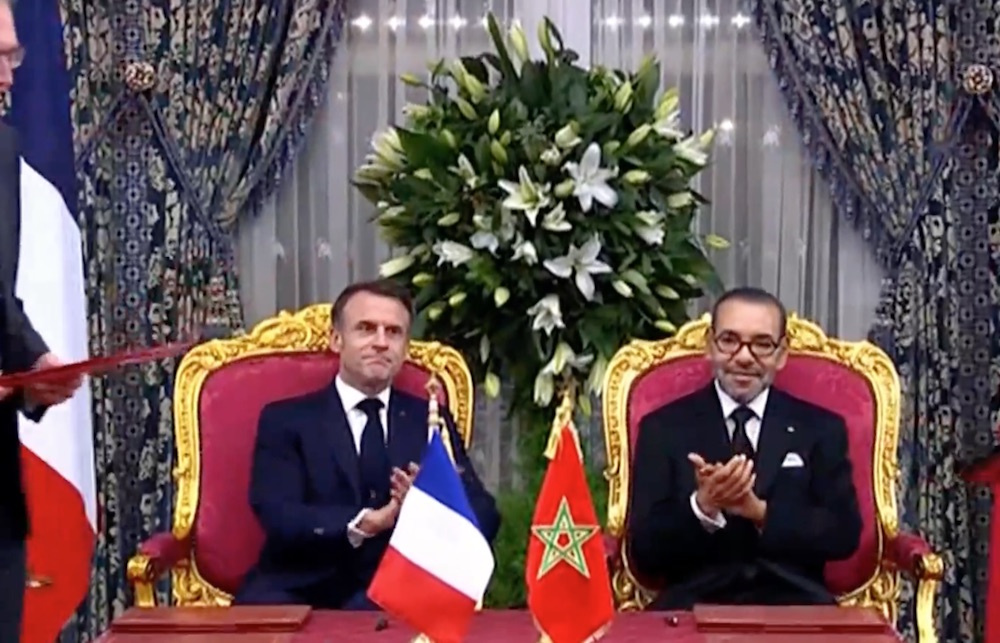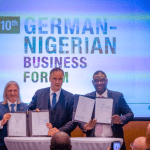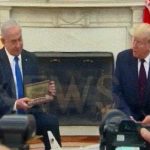France and Morocco have signed deals worth up to €10 billion during President Macron’s visit aimed at improving strained relations.
The deals covered sectors like energy and infrastructure, with more expected.
Macron’s visit follows an invitation by the king amid years of tension.
Several agreements were signed in the presence of Macron and King Mohammed VI, with more planned, including those on energy and infrastructure.
Macron’s trip was at the king’s request in late September, but it also came after years of strained relations with Rabat.
Macron was accompanied by a delegation of French ministers and business executives, and the French and Moroccan flags flew side by side on the city’s main thoroughfares.

The president was accompanied by French Interior Minister Bruno Retailleau, Economy Minister Antoine Armand, and Culture Minister Rachida Dati, who is also of Moroccan descent.
France’s TotalEnergies also inked a deal to develop “green hydrogen” production in the north African country.
Macron’s visit follows years of strained relations between Paris and Rabat over a range of issues.
Western Sahara, a former Spanish colony, is largely controlled by Morocco but claimed by the Algeria-backed Polisario Front, which in 2020 declared a “self-defence war” and seeks the territory’s independence.
It is considered by the United Nations to be a “non-self-governing territory”.
Rabat and Paris have also been at odds after France in 2021 halved the number of visas it granted to Moroccans.
In July, Macron eased tensions by saying Morocco’s autonomy plan for the territory was the “only basis” to resolve the decades-old conflict.
France’s diplomatic turnabout had been awaited by Morocco, whose annexation of Western Sahara had already been recognised by the United States in return for Rabat normalising ties with Israel in 2020.
After Macron endorsed Morocco’s autonomy plan, Algeria promptly withdrew its ambassador to Paris and has yet to send a replacement.
France and Morocco have signed deals worth up to €10 billion during President Macron’s visit aimed at improving strained relations.
The deals covered sectors like energy and infrastructure, with more expected.
Macron’s visit follows an invitation by the king amid years of tension.
Several agreements were signed in the presence of Macron and King Mohammed VI, with more planned, including those on energy and infrastructure.
Macron’s trip was at the king’s request in late September, but it also came after years of strained relations with Rabat.
Macron was accompanied by a delegation of French ministers and business executives, and the French and Moroccan flags flew side by side on the city’s main thoroughfares.

The president was accompanied by French Interior Minister Bruno Retailleau, Economy Minister Antoine Armand, and Culture Minister Rachida Dati, who is also of Moroccan descent.
France’s TotalEnergies also inked a deal to develop “green hydrogen” production in the north African country.
Macron’s visit follows years of strained relations between Paris and Rabat over a range of issues.
Western Sahara, a former Spanish colony, is largely controlled by Morocco but claimed by the Algeria-backed Polisario Front, which in 2020 declared a “self-defence war” and seeks the territory’s independence.
It is considered by the United Nations to be a “non-self-governing territory”.
Rabat and Paris have also been at odds after France in 2021 halved the number of visas it granted to Moroccans.
In July, Macron eased tensions by saying Morocco’s autonomy plan for the territory was the “only basis” to resolve the decades-old conflict.
France’s diplomatic turnabout had been awaited by Morocco, whose annexation of Western Sahara had already been recognised by the United States in return for Rabat normalising ties with Israel in 2020.
After Macron endorsed Morocco’s autonomy plan, Algeria promptly withdrew its ambassador to Paris and has yet to send a replacement.
France and Morocco have signed deals worth up to €10 billion during President Macron’s visit aimed at improving strained relations.
The deals covered sectors like energy and infrastructure, with more expected.
Macron’s visit follows an invitation by the king amid years of tension.
Several agreements were signed in the presence of Macron and King Mohammed VI, with more planned, including those on energy and infrastructure.
Macron’s trip was at the king’s request in late September, but it also came after years of strained relations with Rabat.
Macron was accompanied by a delegation of French ministers and business executives, and the French and Moroccan flags flew side by side on the city’s main thoroughfares.

The president was accompanied by French Interior Minister Bruno Retailleau, Economy Minister Antoine Armand, and Culture Minister Rachida Dati, who is also of Moroccan descent.
France’s TotalEnergies also inked a deal to develop “green hydrogen” production in the north African country.
Macron’s visit follows years of strained relations between Paris and Rabat over a range of issues.
Western Sahara, a former Spanish colony, is largely controlled by Morocco but claimed by the Algeria-backed Polisario Front, which in 2020 declared a “self-defence war” and seeks the territory’s independence.
It is considered by the United Nations to be a “non-self-governing territory”.
Rabat and Paris have also been at odds after France in 2021 halved the number of visas it granted to Moroccans.
In July, Macron eased tensions by saying Morocco’s autonomy plan for the territory was the “only basis” to resolve the decades-old conflict.
France’s diplomatic turnabout had been awaited by Morocco, whose annexation of Western Sahara had already been recognised by the United States in return for Rabat normalising ties with Israel in 2020.
After Macron endorsed Morocco’s autonomy plan, Algeria promptly withdrew its ambassador to Paris and has yet to send a replacement.
France and Morocco have signed deals worth up to €10 billion during President Macron’s visit aimed at improving strained relations.
The deals covered sectors like energy and infrastructure, with more expected.
Macron’s visit follows an invitation by the king amid years of tension.
Several agreements were signed in the presence of Macron and King Mohammed VI, with more planned, including those on energy and infrastructure.
Macron’s trip was at the king’s request in late September, but it also came after years of strained relations with Rabat.
Macron was accompanied by a delegation of French ministers and business executives, and the French and Moroccan flags flew side by side on the city’s main thoroughfares.

The president was accompanied by French Interior Minister Bruno Retailleau, Economy Minister Antoine Armand, and Culture Minister Rachida Dati, who is also of Moroccan descent.
France’s TotalEnergies also inked a deal to develop “green hydrogen” production in the north African country.
Macron’s visit follows years of strained relations between Paris and Rabat over a range of issues.
Western Sahara, a former Spanish colony, is largely controlled by Morocco but claimed by the Algeria-backed Polisario Front, which in 2020 declared a “self-defence war” and seeks the territory’s independence.
It is considered by the United Nations to be a “non-self-governing territory”.
Rabat and Paris have also been at odds after France in 2021 halved the number of visas it granted to Moroccans.
In July, Macron eased tensions by saying Morocco’s autonomy plan for the territory was the “only basis” to resolve the decades-old conflict.
France’s diplomatic turnabout had been awaited by Morocco, whose annexation of Western Sahara had already been recognised by the United States in return for Rabat normalising ties with Israel in 2020.
After Macron endorsed Morocco’s autonomy plan, Algeria promptly withdrew its ambassador to Paris and has yet to send a replacement.
France and Morocco have signed deals worth up to €10 billion during President Macron’s visit aimed at improving strained relations.
The deals covered sectors like energy and infrastructure, with more expected.
Macron’s visit follows an invitation by the king amid years of tension.
Several agreements were signed in the presence of Macron and King Mohammed VI, with more planned, including those on energy and infrastructure.
Macron’s trip was at the king’s request in late September, but it also came after years of strained relations with Rabat.
Macron was accompanied by a delegation of French ministers and business executives, and the French and Moroccan flags flew side by side on the city’s main thoroughfares.

The president was accompanied by French Interior Minister Bruno Retailleau, Economy Minister Antoine Armand, and Culture Minister Rachida Dati, who is also of Moroccan descent.
France’s TotalEnergies also inked a deal to develop “green hydrogen” production in the north African country.
Macron’s visit follows years of strained relations between Paris and Rabat over a range of issues.
Western Sahara, a former Spanish colony, is largely controlled by Morocco but claimed by the Algeria-backed Polisario Front, which in 2020 declared a “self-defence war” and seeks the territory’s independence.
It is considered by the United Nations to be a “non-self-governing territory”.
Rabat and Paris have also been at odds after France in 2021 halved the number of visas it granted to Moroccans.
In July, Macron eased tensions by saying Morocco’s autonomy plan for the territory was the “only basis” to resolve the decades-old conflict.
France’s diplomatic turnabout had been awaited by Morocco, whose annexation of Western Sahara had already been recognised by the United States in return for Rabat normalising ties with Israel in 2020.
After Macron endorsed Morocco’s autonomy plan, Algeria promptly withdrew its ambassador to Paris and has yet to send a replacement.
France and Morocco have signed deals worth up to €10 billion during President Macron’s visit aimed at improving strained relations.
The deals covered sectors like energy and infrastructure, with more expected.
Macron’s visit follows an invitation by the king amid years of tension.
Several agreements were signed in the presence of Macron and King Mohammed VI, with more planned, including those on energy and infrastructure.
Macron’s trip was at the king’s request in late September, but it also came after years of strained relations with Rabat.
Macron was accompanied by a delegation of French ministers and business executives, and the French and Moroccan flags flew side by side on the city’s main thoroughfares.

The president was accompanied by French Interior Minister Bruno Retailleau, Economy Minister Antoine Armand, and Culture Minister Rachida Dati, who is also of Moroccan descent.
France’s TotalEnergies also inked a deal to develop “green hydrogen” production in the north African country.
Macron’s visit follows years of strained relations between Paris and Rabat over a range of issues.
Western Sahara, a former Spanish colony, is largely controlled by Morocco but claimed by the Algeria-backed Polisario Front, which in 2020 declared a “self-defence war” and seeks the territory’s independence.
It is considered by the United Nations to be a “non-self-governing territory”.
Rabat and Paris have also been at odds after France in 2021 halved the number of visas it granted to Moroccans.
In July, Macron eased tensions by saying Morocco’s autonomy plan for the territory was the “only basis” to resolve the decades-old conflict.
France’s diplomatic turnabout had been awaited by Morocco, whose annexation of Western Sahara had already been recognised by the United States in return for Rabat normalising ties with Israel in 2020.
After Macron endorsed Morocco’s autonomy plan, Algeria promptly withdrew its ambassador to Paris and has yet to send a replacement.
France and Morocco have signed deals worth up to €10 billion during President Macron’s visit aimed at improving strained relations.
The deals covered sectors like energy and infrastructure, with more expected.
Macron’s visit follows an invitation by the king amid years of tension.
Several agreements were signed in the presence of Macron and King Mohammed VI, with more planned, including those on energy and infrastructure.
Macron’s trip was at the king’s request in late September, but it also came after years of strained relations with Rabat.
Macron was accompanied by a delegation of French ministers and business executives, and the French and Moroccan flags flew side by side on the city’s main thoroughfares.

The president was accompanied by French Interior Minister Bruno Retailleau, Economy Minister Antoine Armand, and Culture Minister Rachida Dati, who is also of Moroccan descent.
France’s TotalEnergies also inked a deal to develop “green hydrogen” production in the north African country.
Macron’s visit follows years of strained relations between Paris and Rabat over a range of issues.
Western Sahara, a former Spanish colony, is largely controlled by Morocco but claimed by the Algeria-backed Polisario Front, which in 2020 declared a “self-defence war” and seeks the territory’s independence.
It is considered by the United Nations to be a “non-self-governing territory”.
Rabat and Paris have also been at odds after France in 2021 halved the number of visas it granted to Moroccans.
In July, Macron eased tensions by saying Morocco’s autonomy plan for the territory was the “only basis” to resolve the decades-old conflict.
France’s diplomatic turnabout had been awaited by Morocco, whose annexation of Western Sahara had already been recognised by the United States in return for Rabat normalising ties with Israel in 2020.
After Macron endorsed Morocco’s autonomy plan, Algeria promptly withdrew its ambassador to Paris and has yet to send a replacement.
France and Morocco have signed deals worth up to €10 billion during President Macron’s visit aimed at improving strained relations.
The deals covered sectors like energy and infrastructure, with more expected.
Macron’s visit follows an invitation by the king amid years of tension.
Several agreements were signed in the presence of Macron and King Mohammed VI, with more planned, including those on energy and infrastructure.
Macron’s trip was at the king’s request in late September, but it also came after years of strained relations with Rabat.
Macron was accompanied by a delegation of French ministers and business executives, and the French and Moroccan flags flew side by side on the city’s main thoroughfares.

The president was accompanied by French Interior Minister Bruno Retailleau, Economy Minister Antoine Armand, and Culture Minister Rachida Dati, who is also of Moroccan descent.
France’s TotalEnergies also inked a deal to develop “green hydrogen” production in the north African country.
Macron’s visit follows years of strained relations between Paris and Rabat over a range of issues.
Western Sahara, a former Spanish colony, is largely controlled by Morocco but claimed by the Algeria-backed Polisario Front, which in 2020 declared a “self-defence war” and seeks the territory’s independence.
It is considered by the United Nations to be a “non-self-governing territory”.
Rabat and Paris have also been at odds after France in 2021 halved the number of visas it granted to Moroccans.
In July, Macron eased tensions by saying Morocco’s autonomy plan for the territory was the “only basis” to resolve the decades-old conflict.
France’s diplomatic turnabout had been awaited by Morocco, whose annexation of Western Sahara had already been recognised by the United States in return for Rabat normalising ties with Israel in 2020.
After Macron endorsed Morocco’s autonomy plan, Algeria promptly withdrew its ambassador to Paris and has yet to send a replacement.














